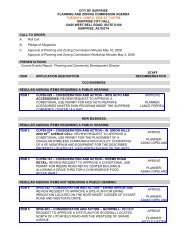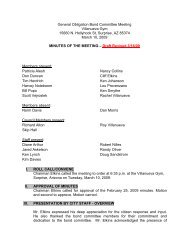FY2014 Recommended Budget - City of Surprise
FY2014 Recommended Budget - City of Surprise
FY2014 Recommended Budget - City of Surprise
Create successful ePaper yourself
Turn your PDF publications into a flip-book with our unique Google optimized e-Paper software.
Improvement districts: This financing method is used to raise capital for projects in which the<br />
residents, who benefit from the improvements, pay for them over time (e.g. street light improvement<br />
district).<br />
Development impact fees: Fees imposed on new development to defray the impact and additional<br />
costs the development places on municipal infrastructure. The city currently has an impact fee<br />
ordinance that applies fees to new development.<br />
Development agreements: Developers construct infrastructure and convey the asset to the city.<br />
According to the terms <strong>of</strong> the agreement, developers are reimbursed for the infrastructure by the city<br />
through collections <strong>of</strong> development impact fees, permit fees, water and wastewater fees, and/or sales<br />
tax revenue.<br />
Grants: Federal, state, and county grants are available to finance capital projects. Many <strong>of</strong> these<br />
grants require the municipality to participate either financially or through “in kind” matches. The city is<br />
the recipient <strong>of</strong> various federal, state, and county grants and pursues grant funding as opportunities<br />
arise.<br />
User fees: Fees paid by service users to maintain existing facilities and meet regulatory<br />
requirements. Utilities such as water, sewer and sanitation fall under this category.<br />
Borrowing Capacity<br />
While it is the desired goal <strong>of</strong> any organization to finance purchases without borrowing (pay-as-you-go),<br />
sometimes financing is used to leverage opportunities. <strong>Surprise</strong> has used various financing methods in<br />
the past to purchase vehicles and equipment and finance the development <strong>of</strong> other municipal services.<br />
The most commonly utilized large project municipal financing method in the United States <strong>of</strong> America is<br />
the general obligation bond (G.O. bond). This is the most inexpensive way to finance projects because<br />
the bond’s repayment is based on the full taxing authority <strong>of</strong> the municipality and backed up by real<br />
property. Voters have to approve the property taxes (secondary) instituted to pay for the issuance <strong>of</strong> G.O.<br />
bonds.<br />
The state <strong>of</strong> Arizona places limits on this type <strong>of</strong> financing. Under Arizona Law, Article IX, Section 8,<br />
municipalities may issue G.O. bonds for purposes <strong>of</strong> water, wastewater, artificial light, open space<br />
preserves, parks and recreational facilities, public safety, law enforcement, fire and emergency services<br />
facilities, streets, and transportation facilities up to an amount not exceeding 20 percent <strong>of</strong> the secondary<br />
assessed value. Based on <strong>Surprise</strong>’s secondary assessed valuation <strong>of</strong> $854,683,673, a total <strong>of</strong><br />
$170,936,735 could be borrowed utilizing G.O. Bonds. The city currently has no outstanding G.O. Bonds<br />
debt in the 20 percent category.<br />
In addition, Arizona law allows municipalities to issue G.O. Bonds for all other purposes not listed above<br />
up to an amount not exceeding six percent <strong>of</strong> the valuation. This would allow <strong>Surprise</strong> to bond for<br />
$51,281,020 under this category. The city currently has no outstanding G.O. Bonded debt in the six<br />
percent category.<br />
<strong>Surprise</strong>’s other debt does not count against these limits; although, the overall financial position <strong>of</strong> the city<br />
would be considered by lending institutions.<br />
Outstanding Debt<br />
As <strong>of</strong> June 30, 2013, the city <strong>of</strong> <strong>Surprise</strong> held the following outstanding long-term debt obligations. The<br />
total amount <strong>of</strong> outstanding debt and year <strong>of</strong> debt retirement are indicated:<br />
Debt<br />
Retirement<br />
Date<br />
Oustanding<br />
Balance as <strong>of</strong><br />
June, 30 2013<br />
Outstanding Debt<br />
Municipal Property Corporation Bonds: 2000-2003 Issuance 7/1/2020 $ 31,870,000<br />
Municipal Property Corporation Bonds: 2007 Issuance 4/1/2032 50,675,000<br />
Total $ 82,545,000<br />
210




